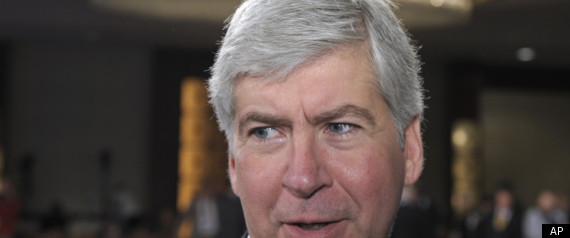
AP FILE: Rick Snyder
WASHINGTON -- Gov. Rick Snyder signed controversial legislation on Monday, making Michigan the first state in the country to reduce unemployment insurance for those who lose their jobs through no fault of their own. Starting in January, laid-off Michiganders will be eligible for 20 weeks of jobless aid, instead of the standard 26 weeks.
Snyder, a Republican, said the change was necessary to win political support in the Michigan legislature for maintaining the state's eligibility for the federal Extended Benefits program, which provides 20 weeks of benefits for the long-term unemployed. Without the bill, an estimated 35,000 Michiganders would not have received their EB checks in April.
"These benefits are a lifeline for many Michigan families who are struggling in this challenging economy," Snyder said in a statement. "Cutting them off so abruptly would have jeopardized the well-being of those who are trying hard to find work."
EB kicks in for people who exhaust 53 weeks of federal Emergency Unemployment Compensation and 26 weeks of state benefits. Opponents of the bill say the EB measure was not worth reducing the state benefits. Advocates of unemployment insurance fear other states will follow Michigan's lead.
Michigan Democrats in the U.S. Senate and House of Representatives asked Snyder in a letter on Monday to veto the bill, saying the change would "turn back the clock on 50 years of needed protections for the unemployed in Michigan."
Daniel Ytterock of Redford, Mich. told HuffPost that he lost his job in publishing sales in July 2009 and is currently on the final tier of EUC. He said he doesn't love the deal, but that knowing he'll still be able to receive EB in the coming months gives him peace of mind.
"After so many months and years looking for a job, I don’t see any signs that looking for a job is going to get easier or more successful," he said. "I just feel bad for the others that follow after January."
Both federal programs are set to expire in January, and the Michigan Democrats wrote that there is "absolutely no guarantee they will be extended," meaning laid-off Michiganders could be left with just 20 weeks of benefits. "In 2010, over 171,000 individuals drew more than 20 weeks of regular UI benefits, with 130,000 of these drawing 26 weeks," the delegation wrote.
"There is no valid reason why keeping federally-financed Extended Benefits in place in Michigan should require a permanent reduction in the 26 weeks of unemployment benefits paid in our state’s UI program," Rick McHugh, a staff attorney with the National Employment Law Project, said in a statement. "The Governor’s actions today mean that Michigan will be the only state paying less than 26 weeks for their maximum duration of benefits in the U.S. Michigan has paid 26 weeks of benefits since 1954."
Many states are considering new laws to maintain eligibility for EB, which triggers based on unemployment patterns in the state over the previous two years. The legislation adjusts the trigger to look back three years instead of two.
The Michigan Chamber of Commerce lobbied against a standalone EB fix, arguing that further depleting the federal government's unemployment insurance trust fund would eventually result in higher unemployment surtaxes on businesses.
No comments:
Post a Comment